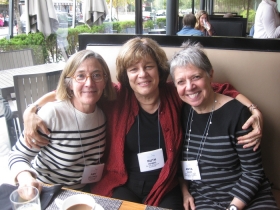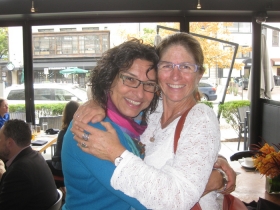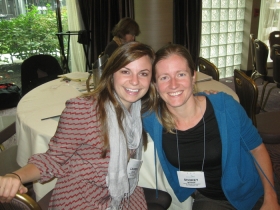HEFN Communications Associate Lauren Linville authored this blog post.
What keeps funders and advocates in this field going when the stakes are high and the obstacles seem even higher? Knowing that people – when given a little help and half a chance – can build power to protect health, the environment, and communities.
Even more uplifting is the news that shifts in the American electorate indicate great opportunities to galvanize support for environmental health and justice issues, as unmarried women, people of color, and young voters become the new majority. These realities were front and center for HEFN’s 2013 Annual Meeting, “Power of People: Moving Hearts, Minds, & Policy to Win,” held in Washington, DC on October 29-30.
This event highlighted demographic shifts and political contexts shaping environment, health, and justice outcomes. Speakers described innovative state alliances, demonstrated cool monitoring tools, and explained new science about how environmental exposures affect human health. Short “TED talk” style sessions provided need-to-know information on civic engagement topics like demographics, redistricting, and money-in-politics. A stirring keynote presentation from Judith Browne Dianis of the Advancement Project offered insights into the frontlines of civil rights and voter engagement issues and made the case that protecting democracy is key to making progress on environmental health and environmental justice.
A handful of themes and takeaways emerged over the two-day meeting:
Develop authentic alliances
Many advocates are struggling to move their issues forward in the face of powerful interests. Over and over again, speakers emphasized the importance of building authentic, transformational relationships, not just transactional alliances. An example of partnerships among farmworkers, labor union organizers and LGBTQ advocates in Oregon illustrated ways in which groups have harnessed the “power in numbers” to win on multiple issues.
Demography is not destiny
The changing demographics of the U.S. electorate are exciting opportunities for the progressive movement. Research shows young people, unmarried women and people of color are among the most supportive of issues like environmental heath and justice. However, work must be done on the ground to build relationships with these groups, support their work, and develop strategies for moving environmental health and justice goals forward.
Democracy matters
The changing demographics of the U.S. States won't translate into political power if people can’t vote. So far this year, nine states enacted legislation that poses numerous obstacles on voter rights, including ID requirements, shortening voting hours, and reducing early voting. Coupled with the Supreme Court ruling that struck down critical provisions of the Voting Rights Act, these attacks on democracy are concerns for everyone hoping to mobilize the emerging majorities to get out and vote.
Citizen science can help make change
Academics, scientists, and advocates are deploying new tools and technology to support work on critical environmental health and science issues. Often using household items, simple observation methods, and free and open source software, these groups are making it easier for communities to investigate and take action on environmental health hazards like air pollution.
Stick with it
It takes time to build lasting relationships and integrate work across issues and priorities. Revitalizing democracy and civic participation will require sustained work; there is no “off-year”. Funders can play a key role by providing long-term investment, support, and leadership to groups building capacities for voter engagement and strategic alliances.
Watch our website next week for presentations and other materials related to this year’s Annual Meeting.




